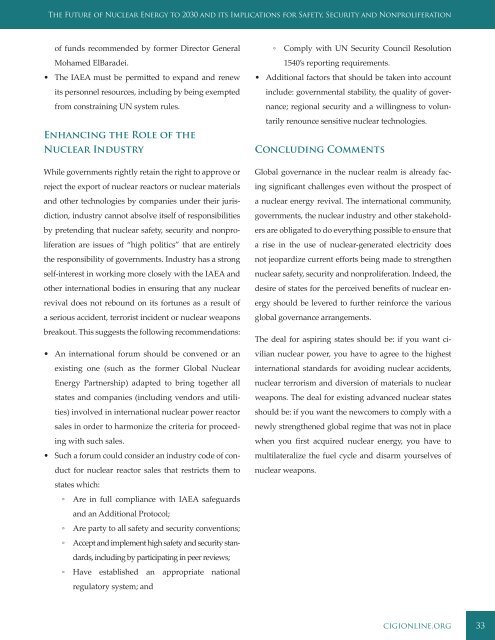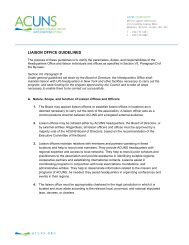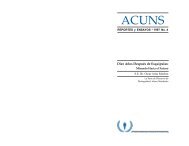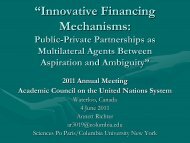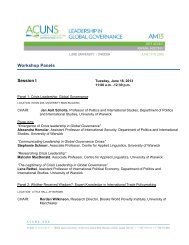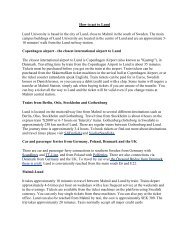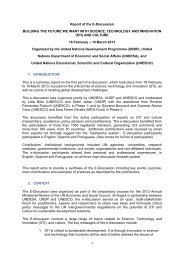THE FUTURE OF NUCLEAR ENERGY TO 2030 AND ITS ... - acuns
THE FUTURE OF NUCLEAR ENERGY TO 2030 AND ITS ... - acuns
THE FUTURE OF NUCLEAR ENERGY TO 2030 AND ITS ... - acuns
Create successful ePaper yourself
Turn your PDF publications into a flip-book with our unique Google optimized e-Paper software.
The Future of Nuclear Energy to <strong>2030</strong> and its Implications for Safety, Security and Nonproliferation<br />
of funds recommended by former Director General<br />
Mohamed ElBaradei.<br />
• The IAEA must be permitted to expand and renew<br />
its personnel resources, including by being exempted<br />
from constraining UN system rules.<br />
Enhancing the Role of the<br />
Nuclear Industry<br />
While governments rightly retain the right to approve or<br />
reject the export of nuclear reactors or nuclear materials<br />
and other technologies by companies under their jurisdiction,<br />
industry cannot absolve itself of responsibilities<br />
by pretending that nuclear safety, security and nonproliferation<br />
are issues of “high politics” that are entirely<br />
the responsibility of governments. Industry has a strong<br />
self-interest in working more closely with the IAEA and<br />
other international bodies in ensuring that any nuclear<br />
revival does not rebound on its fortunes as a result of<br />
a serious accident, terrorist incident or nuclear weapons<br />
breakout. This suggests the following recommendations:<br />
• An international forum should be convened or an<br />
existing one (such as the former Global Nuclear<br />
Energy Partnership) adapted to bring together all<br />
states and companies (including vendors and utilities)<br />
involved in international nuclear power reactor<br />
sales in order to harmonize the criteria for proceeding<br />
with such sales.<br />
• Such a forum could consider an industry code of conduct<br />
for nuclear reactor sales that restricts them to<br />
states which:<br />
◦◦<br />
Are in full compliance with IAEA safeguards<br />
and an Additional Protocol;<br />
◦◦<br />
Are party to all safety and security conventions;<br />
◦ Accept and implement high safety and security standards,<br />
including by participating in peer reviews;<br />
◦◦<br />
Have established an appropriate national<br />
regulatory system; and<br />
◦◦<br />
Comply with UN Security Council Resolution<br />
1540’s reporting requirements.<br />
• Additional factors that should be taken into account<br />
include: governmental stability, the quality of governance;<br />
regional security and a willingness to voluntarily<br />
renounce sensitive nuclear technologies.<br />
Concluding Comments<br />
Global governance in the nuclear realm is already facing<br />
significant challenges even without the prospect of<br />
a nuclear energy revival. The international community,<br />
governments, the nuclear industry and other stakeholders<br />
are obligated to do everything possible to ensure that<br />
a rise in the use of nuclear-generated electricity does<br />
not jeopardize current efforts being made to strengthen<br />
nuclear safety, security and nonproliferation. Indeed, the<br />
desire of states for the perceived benefits of nuclear energy<br />
should be levered to further reinforce the various<br />
global governance arrangements.<br />
The deal for aspiring states should be: if you want civilian<br />
nuclear power, you have to agree to the highest<br />
international standards for avoiding nuclear accidents,<br />
nuclear terrorism and diversion of materials to nuclear<br />
weapons. The deal for existing advanced nuclear states<br />
should be: if you want the newcomers to comply with a<br />
newly strengthened global regime that was not in place<br />
when you first acquired nuclear energy, you have to<br />
multilateralize the fuel cycle and disarm yourselves of<br />
nuclear weapons.<br />
cigionline.org 33


